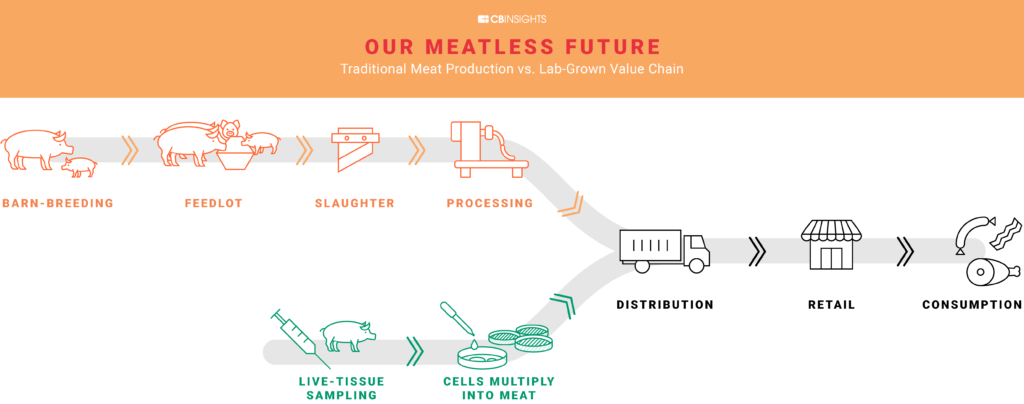As a side note, has the U.N. told our Hindu brothers and sister the cows have to go?
From CB Insights:
Will a meatless food industry featuring lab-grown meat, seafood substitutes, and insect protein be the future of food? Food giants from Tyson to Cargill are working to navigate a future where protein isn't dominated by traditional animal sources.
At the moment, meat is still king.
By some estimates, 30% of the calories consumed globally by humans come from meat products, including beef, chicken, and pork. The global meat market is worth $1.8T, according to CB Insights’ Industry Analyst Consensus.
Americans consumed a near-record 220 pounds of red meat and poultry per capita in 2018 — in 1960, that figure was just 167 pounds, according to the USDA.
Also in 2018, USDA figures showed domestic production of meat hit a record high of more than 100B pounds. That translates to a staggering number of animals grown for food: around 30M beef cows in the US and 20M+ pigs in Iowa alone.
To meet this skyrocketing demand, the meat industry has evolved into a complex global business that involves farms and feed lots, as well as meat middle-men, like processing and storage centers, transportation and logistics, slaughterhouses, and more.
Together, the 6 largest meat companies represent $60B in market capitalization — as of the beginning of the year — with the largest, Hormel, boasting a $23B valuation.

The industry has seen massive consolidation, as companies like Hormel and Brazil-based JBS have grown bigger and bigger through the acquisition of new meat brands and products.
Since 2014, Hormel has spent around $3B on acquisitions, including Applegate, Fontanini Italian Meats and Sausages, Ceratti, and Columbus Manufacturing.
One of the biggest deals in this space was pork producer WH Group’s 2013 acquisition of US-based Smithfield Foods, which owns brands such as Armour and Farmland. At the time of the deal, Smithfield was valued at $7.1B.
Despite high-profile deals in the sector, the industrial meat industry faces a rising tide of challenges related to business, ethical, and environmental concerns.
Meanwhile, startups using technology to engineer meat in labs or manufacture it from plant-based products are rising in popularity. In 2019, one of the world’s biggest alternative protein brands, Beyond Meat, the manufacturer of the plant-based Beyond Burger, went public at a valuation of almost $1.5B.
Shortly after, Burger King released the Impossible Whopper — a meatless variant of its most well-known product. The Impossible Whopper replaces beef with plant-based meat manufactured by Impossible Foods, a Redwood City-based company that has raised more than $700M in disclosed equity funding. The company was given a valuation of $2B at its last funding round.
In addition to offering new products, these alternative protein startups have the potential to upend the meat production process.
Going forward, the meat value chain could be simplified dramatically, as “clean meat” labs could take the place of farms, feed lots, and slaughterhouses.
....MUCH, MUCH MOREEspecially vulnerable to these changes are food companies like Tyson, Pilgrim’s, and Sanderson Farms, which rely on animal meat products for 80% or more of their revenue, as seen below....
